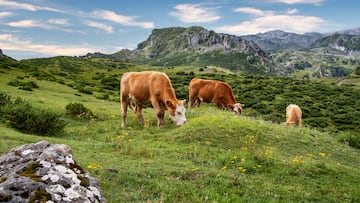China clones three ‘supercows’
The Friesian bovines were bred in the region of Ningxia. The calves born will be able to produce 18 tons of milk per year, 100 tons during their lives.

Scientists from the Northwest University of Agricultural and Forestry Sciences and Technology claimed to have successfully cloned three ‘super cows’ that would produce more milk than normal cows. These are three Holstein Friesian calves, which were raised in the autonomous region of Ningxia, in the north of the Asian country.
As reported by ‘CNN’, the calves were cloned from cows from the Netherlands and are capable of producing an average of 18 tons of milk per year, which is the equivalent of about 100 tons throughout their life. Speaking to the ‘Global Times’, the lead author of the study, Jin Yaping, described it as a “breakthrough that would allow the Asian giant to preserve the best batches of cows in an ‘economically viable way.’”
Researchers created up to 120 cloned embryos from the ear cells of highly productive Friesian cows, and implanted them in other specimens. The United States Department of Agriculture detailed that these cows would produce 1.7 times more milk than a North American cow. On the other hand, Yaping himself assured that the objective is to create a huge herd of 'supercows' that guarantee milk production for the entire country.
“We plan to take two to three years to build a herd of more than 1,000 supercows, as a solid foundation to address China’s reliance on dairy cows abroad.” In other words, it would also seek to reduce as much as possible the importation of cows from other countries and guarantee the production of national milk.
However, it is not the first time that animal cloning has been carried out in the Asian powerhouse. Last September, China managed to clone an arctic wolf by taking skin samples from another specimen of the species as a reference, as well as an embryo, which was gestated in the womb of a beagle dog. For their part, in 2017, Chinese scientists said they produced cloned cattle with greater resistance to bovine tuberculosis.
Almost 40 million tons of milk produced in 2022
According to data from the Ministry of Agriculture and Rural Affairs of the Asian giant, some 39.7 million tons were produced in China. As for production, it is expected to reach a maximum of 54 million tons by 2030. The demand for dairy products increased in the last year by 3.6%, as shown in the figures reported by the Chinese government.





